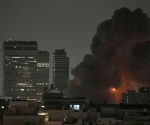Game over for Iran – three policy shifts West must enact in new age | World | News
Recently, together with former MPs Liam Fox and David Jones, and veteran German politicians Peter Altmaier and Herta Däubler-Gmelin, we drafted a white paper proposing a new policy approach toward Iran. And right now the confrontation between Israel and Iran underscores the urgency of our proposal: a shift from engaging the regime to supporting the democratic opposition.
For more than four decades, Iran’s clerical regime has preserved its grip on power through a dual strategy: ruthless domestic repression and aggressive regional expansionism. Despite successive efforts by Western governments to moderate its behaviour through diplomacy and sanctions, Tehran continues to escalate its authoritarian and belligerent conduct — both at home and abroad.
With new governments in place in the United States, the European Union, Germany and the United Kingdom, the moment is opportune for a serious reassessment of Western policy toward Iran. The time has come for a shift from reactive containment to proactive engagement — specifically, with Iran’s democratic opposition. The current moment, marked by deep regime vulnerability and rising civic unrest, offers both urgency and opportunity for a principled new approach.
Iran’s human rights abuses remain among the worst globally. The country leads the world in executions per capita, including the execution of minors — making it the only nation known to execute children under its own legal system. Since President Masoud Pezeshkian’s inauguration, over 1,300 people have been executed, including more than 30 women and several juveniles.
These numbers do not reflect mere excesses but rather a calculated strategy to extinguish dissent. Political activists, many of them affiliated with the opposition, face death sentences or arbitrary detention. Tehran’s repression is a tacit admission that it views organised resistance as an existential threat.
Externally, the regime has long relied on exporting its ideology and securing strategic depth via proxy militias. From Hezbollah in Lebanon to armed groups in Iraq, Syria, and Yemen, Iran has cultivated a regional architecture of instability designed to project power and deter foreign pressure.
Western governments have too often failed to appreciate the coherence and intent behind this strategy. The prevailing posture — seeking modest behavioural adjustments through economic incentives—has enabled Tehran to entrench its influence with impunity.
However, cracks are forming. The dismantling of Hezbollah’s leadership and the fall of Bashar al-Assad in Syria — once referred to by Tehran as Iran’s “35th province” — have dealt serious blows to Iran’s regional reach.
Tehran’s use of terror is no longer confined to the Middle East. Assassination attempts and attacks against dissidents in European capitals — including Paris, Berlin, London, and Stockholm — underscore a strategy of extraterritorial repression. The attempted murder of former European Parliament Vice President Alejo Vidal-Quadras, a vocal supporter of the Iranian opposition, exemplifies this trend.
Iran’s increasing reliance on organised crime networks like the Macro Mafia further complicates law enforcement responses and reflects a calculated effort to outsource violence while evading accountability.
Multiple structural pressures are converging on the Iranian regime.
Domestic unrest: Since the September 2022 uprising, Resistance Units affiliated with the People’s Mojahedin Organisation of Iran (PMOI/MEK) have sustained a wave of dissent across all 31 provinces.
Economic deterioration: Rampant corruption, inflation, and mismanagement have intensified poverty and unemployment, fuelling popular anger.
Strategic overreach: Tehran’s orchestration of the October 2023 regional escalation — via Hezbollah, the Houthis, and militias in Iraq and Syria — was intended to distract from internal vulnerabilities. Instead, the strategy backfired, amplifying regional and domestic dissent.
Despite these mounting crises, the regime remains entrenched in its policies. Khamenei continues to rule out nuclear negotiations, and executions have increased during Pezeshkian’s presidency. Yet this intransigence increasingly reflects weakness, not strength.
The West has long failed to engage meaningfully with Iran’s democratic opposition. Decades of regime-led disinformation have painted the National Council of Resistance of Iran (NCRI) and its key component, the PMOI/MEK, as fringe or illegitimate. These claims have served to justify a policy of appeasement grounded in the false premise that no viable alternative exists.
In fact, a growing network of Resistance Units inside Iran has coordinated protests, challenged security forces, and spread pro-democracy messaging even under severe repression. These are not spontaneous or isolated acts of dissent; they reflect a disciplined, organised political force with a strategic vision for Iran’s future.
The NCRI’s President-elect, Maryam Rajavi, has presented a Ten-Point Plan outlining a roadmap for a secular, democratic, and non-nuclear Iran. It includes gender equality, free elections, the separation of religion and state, recognition of ethnic autonomy within a unified nation, and engagement with international norms. More than 130 former world leaders and 4,000 legislators globally have expressed support for this platform.
If the West is serious about addressing the Iranian challenge, it must move beyond sanctions and statements. It must adopt a comprehensive and strategic policy, grounded in three core principles:
1. Apply maximum pressure on the regime: Sanction key sectors including oil and banking; activate UN snapback mechanisms; and designate the Islamic Revolutionary Guard Corps (IRGC) as a terrorist entity across Europe.
2. Support human rights and accountability: Publicly denounce Iran’s human rights abuses and advocate for the prosecution of regime officials for crimes against humanity.
3. Recognise and engage the democratic opposition: Acknowledge that real change must come from within Iran — from its people and their organised resistance. The NCRI offers a credible partner for an orderly, democratic transition.
The Iranian regime’s trajectory of repression and regional aggression poses a persistent threat not only to its citizens but also to global stability. But its vulnerabilities are mounting. The international community has a rare opportunity to support the Iranian people’s desire for change — and to do so in a way that promotes regional peace and democratic values.
Standing with Iran’s democratic opposition is not only a moral imperative — it is a strategic necessity.
Guy Verhofstadt is former Prime Minister of Belgium; Peter Altmaier is former Minister of the Economy and Head of the Chancellery, Germany; Herta Daubler-Gmelin is former Minister of Justice, Germany; Liam Fox is former UK Secretary of State for Defence; and David Jones is former UK Secretary of State for Wales.









